Critical Review: Nurses' Attitudes & Knowledge on HIV Patient Care
VerifiedAdded on 2021/10/29
|7
|1873
|280
Essay
AI Summary
This essay provides a critical review of three research papers—one qualitative and two quantitative—focusing on nurses' attitudes and knowledge concerning HIV patient care. The qualitative study explores Colombian nurses' views on caring for HIV patients, highlighting themes such as nurses' reflections on attitudes, their roles and responsibilities, and thoughts about patients and the disease. The first quantitative paper examines the attitudes, concerns, gloving practices, and knowledge of nurses in a Taiwanese hospital, revealing concerns related to HIV and hepatitis contraction. The second quantitative study assesses the knowledge and attitudes of registered nurses in a rural South African hospital, indicating a negative attitude among many nurses despite their level of professional knowledge. The essay concludes that education and knowledge significantly impact nurses' attitudes towards HIV patients, recommending further research with broader participant bases and diverse settings to enhance the quality of care and reduce stigma.
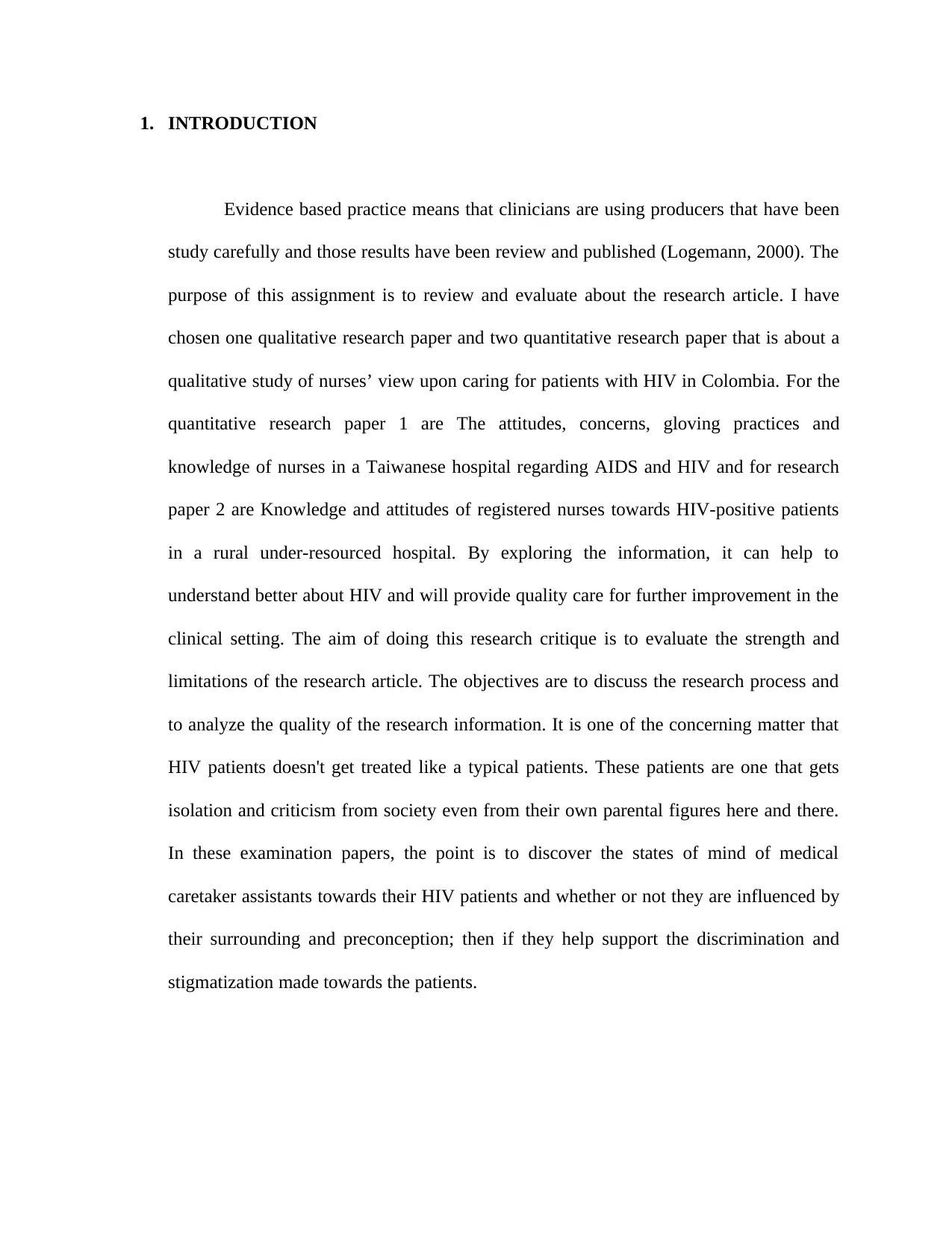
1. INTRODUCTION
Evidence based practice means that clinicians are using producers that have been
study carefully and those results have been review and published (Logemann, 2000). The
purpose of this assignment is to review and evaluate about the research article. I have
chosen one qualitative research paper and two quantitative research paper that is about a
qualitative study of nurses’ view upon caring for patients with HIV in Colombia. For the
quantitative research paper 1 are The attitudes, concerns, gloving practices and
knowledge of nurses in a Taiwanese hospital regarding AIDS and HIV and for research
paper 2 are Knowledge and attitudes of registered nurses towards HIV-positive patients
in a rural under-resourced hospital. By exploring the information, it can help to
understand better about HIV and will provide quality care for further improvement in the
clinical setting. The aim of doing this research critique is to evaluate the strength and
limitations of the research article. The objectives are to discuss the research process and
to analyze the quality of the research information. It is one of the concerning matter that
HIV patients doesn't get treated like a typical patients. These patients are one that gets
isolation and criticism from society even from their own parental figures here and there.
In these examination papers, the point is to discover the states of mind of medical
caretaker assistants towards their HIV patients and whether or not they are influenced by
their surrounding and preconception; then if they help support the discrimination and
stigmatization made towards the patients.
Evidence based practice means that clinicians are using producers that have been
study carefully and those results have been review and published (Logemann, 2000). The
purpose of this assignment is to review and evaluate about the research article. I have
chosen one qualitative research paper and two quantitative research paper that is about a
qualitative study of nurses’ view upon caring for patients with HIV in Colombia. For the
quantitative research paper 1 are The attitudes, concerns, gloving practices and
knowledge of nurses in a Taiwanese hospital regarding AIDS and HIV and for research
paper 2 are Knowledge and attitudes of registered nurses towards HIV-positive patients
in a rural under-resourced hospital. By exploring the information, it can help to
understand better about HIV and will provide quality care for further improvement in the
clinical setting. The aim of doing this research critique is to evaluate the strength and
limitations of the research article. The objectives are to discuss the research process and
to analyze the quality of the research information. It is one of the concerning matter that
HIV patients doesn't get treated like a typical patients. These patients are one that gets
isolation and criticism from society even from their own parental figures here and there.
In these examination papers, the point is to discover the states of mind of medical
caretaker assistants towards their HIV patients and whether or not they are influenced by
their surrounding and preconception; then if they help support the discrimination and
stigmatization made towards the patients.
Paraphrase This Document
Need a fresh take? Get an instant paraphrase of this document with our AI Paraphraser
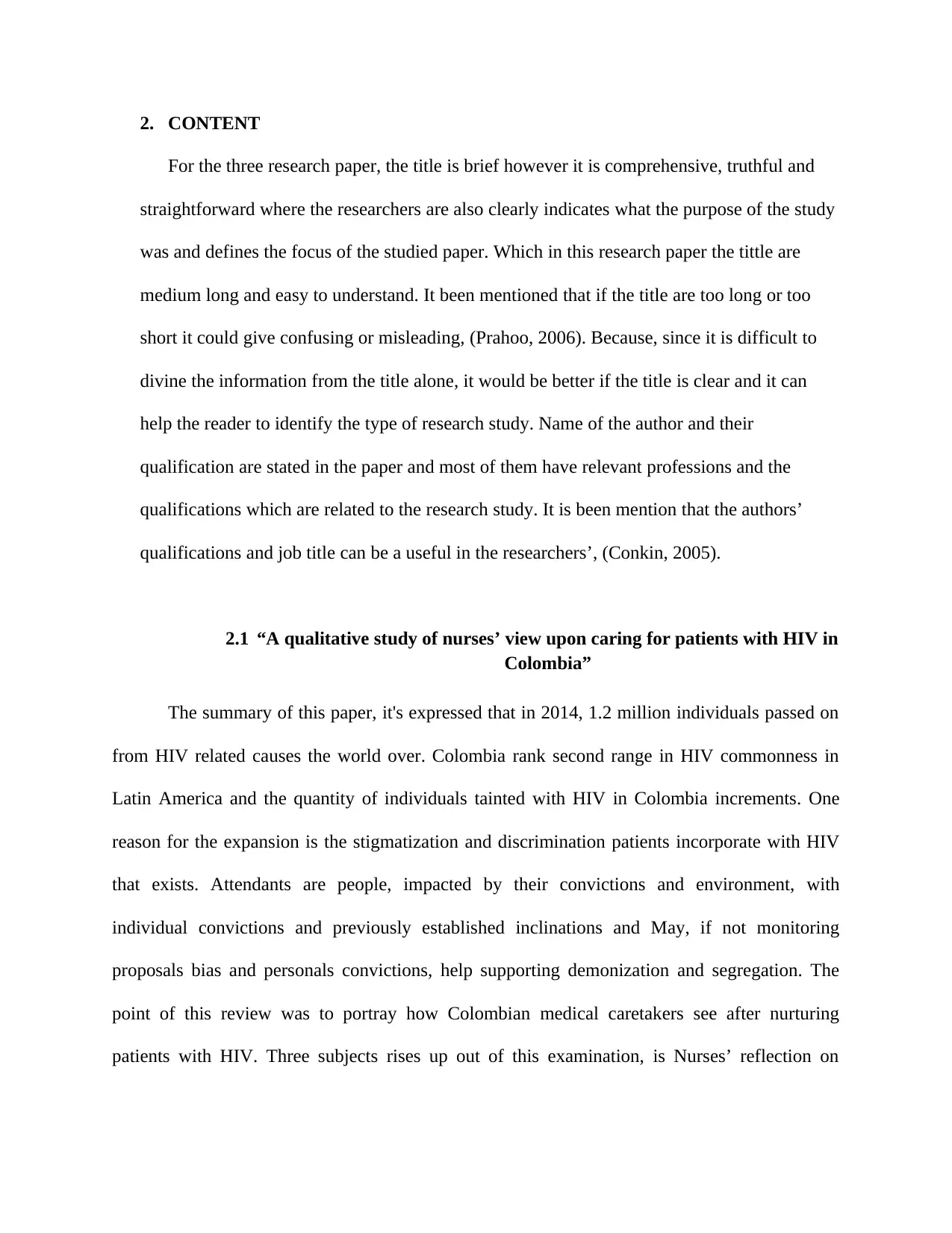
2. CONTENT
For the three research paper, the title is brief however it is comprehensive, truthful and
straightforward where the researchers are also clearly indicates what the purpose of the study
was and defines the focus of the studied paper. Which in this research paper the tittle are
medium long and easy to understand. It been mentioned that if the title are too long or too
short it could give confusing or misleading, (Prahoo, 2006). Because, since it is difficult to
divine the information from the title alone, it would be better if the title is clear and it can
help the reader to identify the type of research study. Name of the author and their
qualification are stated in the paper and most of them have relevant professions and the
qualifications which are related to the research study. It is been mention that the authors’
qualifications and job title can be a useful in the researchers’, (Conkin, 2005).
2.1 “A qualitative study of nurses’ view upon caring for patients with HIV in
Colombia”
The summary of this paper, it's expressed that in 2014, 1.2 million individuals passed on
from HIV related causes the world over. Colombia rank second range in HIV commonness in
Latin America and the quantity of individuals tainted with HIV in Colombia increments. One
reason for the expansion is the stigmatization and discrimination patients incorporate with HIV
that exists. Attendants are people, impacted by their convictions and environment, with
individual convictions and previously established inclinations and May, if not monitoring
proposals bias and personals convictions, help supporting demonization and segregation. The
point of this review was to portray how Colombian medical caretakers see after nurturing
patients with HIV. Three subjects rises up out of this examination, is Nurses’ reflection on
For the three research paper, the title is brief however it is comprehensive, truthful and
straightforward where the researchers are also clearly indicates what the purpose of the study
was and defines the focus of the studied paper. Which in this research paper the tittle are
medium long and easy to understand. It been mentioned that if the title are too long or too
short it could give confusing or misleading, (Prahoo, 2006). Because, since it is difficult to
divine the information from the title alone, it would be better if the title is clear and it can
help the reader to identify the type of research study. Name of the author and their
qualification are stated in the paper and most of them have relevant professions and the
qualifications which are related to the research study. It is been mention that the authors’
qualifications and job title can be a useful in the researchers’, (Conkin, 2005).
2.1 “A qualitative study of nurses’ view upon caring for patients with HIV in
Colombia”
The summary of this paper, it's expressed that in 2014, 1.2 million individuals passed on
from HIV related causes the world over. Colombia rank second range in HIV commonness in
Latin America and the quantity of individuals tainted with HIV in Colombia increments. One
reason for the expansion is the stigmatization and discrimination patients incorporate with HIV
that exists. Attendants are people, impacted by their convictions and environment, with
individual convictions and previously established inclinations and May, if not monitoring
proposals bias and personals convictions, help supporting demonization and segregation. The
point of this review was to portray how Colombian medical caretakers see after nurturing
patients with HIV. Three subjects rises up out of this examination, is Nurses’ reflection on
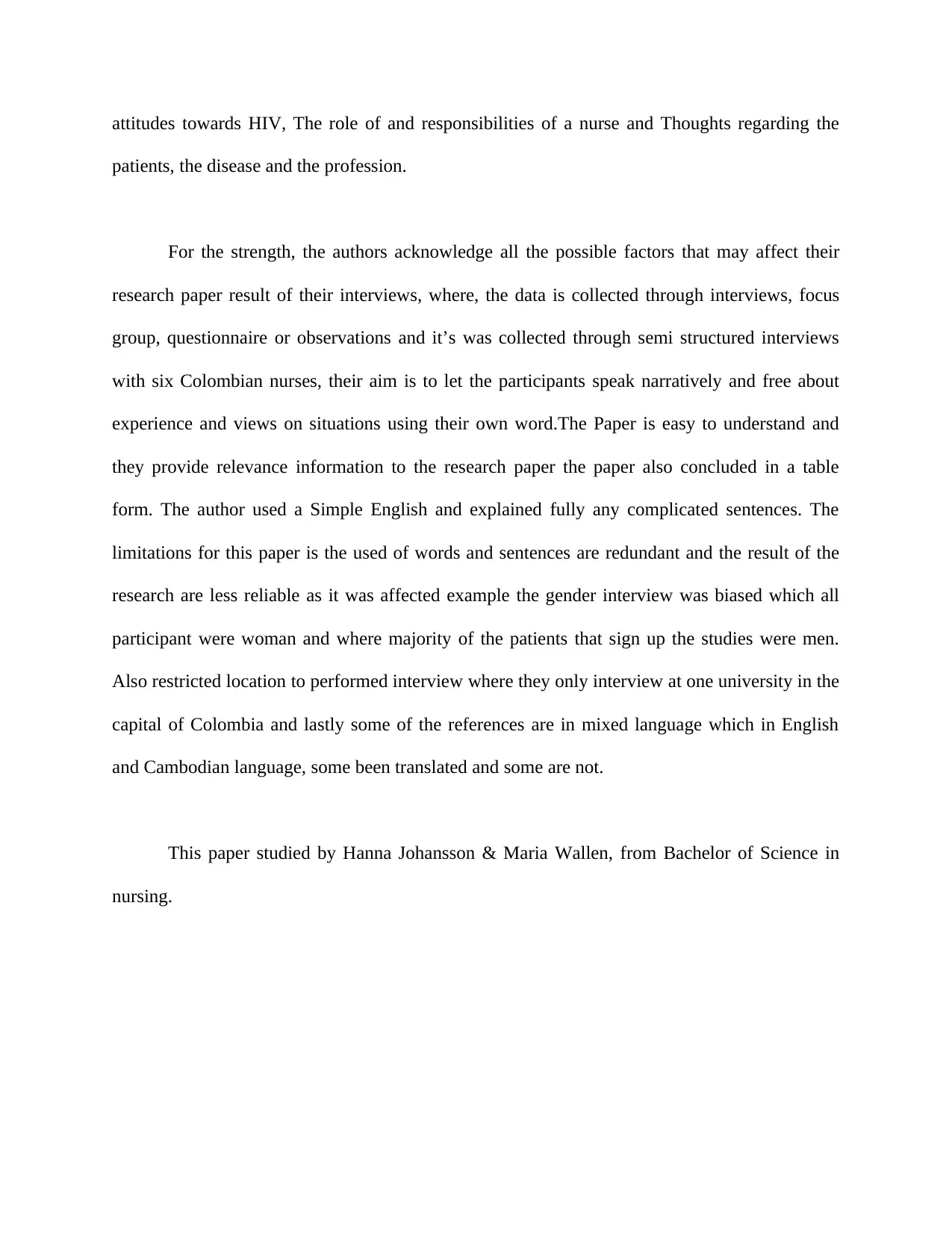
attitudes towards HIV, The role of and responsibilities of a nurse and Thoughts regarding the
patients, the disease and the profession.
For the strength, the authors acknowledge all the possible factors that may affect their
research paper result of their interviews, where, the data is collected through interviews, focus
group, questionnaire or observations and it’s was collected through semi structured interviews
with six Colombian nurses, their aim is to let the participants speak narratively and free about
experience and views on situations using their own word.The Paper is easy to understand and
they provide relevance information to the research paper the paper also concluded in a table
form. The author used a Simple English and explained fully any complicated sentences. The
limitations for this paper is the used of words and sentences are redundant and the result of the
research are less reliable as it was affected example the gender interview was biased which all
participant were woman and where majority of the patients that sign up the studies were men.
Also restricted location to performed interview where they only interview at one university in the
capital of Colombia and lastly some of the references are in mixed language which in English
and Cambodian language, some been translated and some are not.
This paper studied by Hanna Johansson & Maria Wallen, from Bachelor of Science in
nursing.
patients, the disease and the profession.
For the strength, the authors acknowledge all the possible factors that may affect their
research paper result of their interviews, where, the data is collected through interviews, focus
group, questionnaire or observations and it’s was collected through semi structured interviews
with six Colombian nurses, their aim is to let the participants speak narratively and free about
experience and views on situations using their own word.The Paper is easy to understand and
they provide relevance information to the research paper the paper also concluded in a table
form. The author used a Simple English and explained fully any complicated sentences. The
limitations for this paper is the used of words and sentences are redundant and the result of the
research are less reliable as it was affected example the gender interview was biased which all
participant were woman and where majority of the patients that sign up the studies were men.
Also restricted location to performed interview where they only interview at one university in the
capital of Colombia and lastly some of the references are in mixed language which in English
and Cambodian language, some been translated and some are not.
This paper studied by Hanna Johansson & Maria Wallen, from Bachelor of Science in
nursing.
⊘ This is a preview!⊘
Do you want full access?
Subscribe today to unlock all pages.

Trusted by 1+ million students worldwide
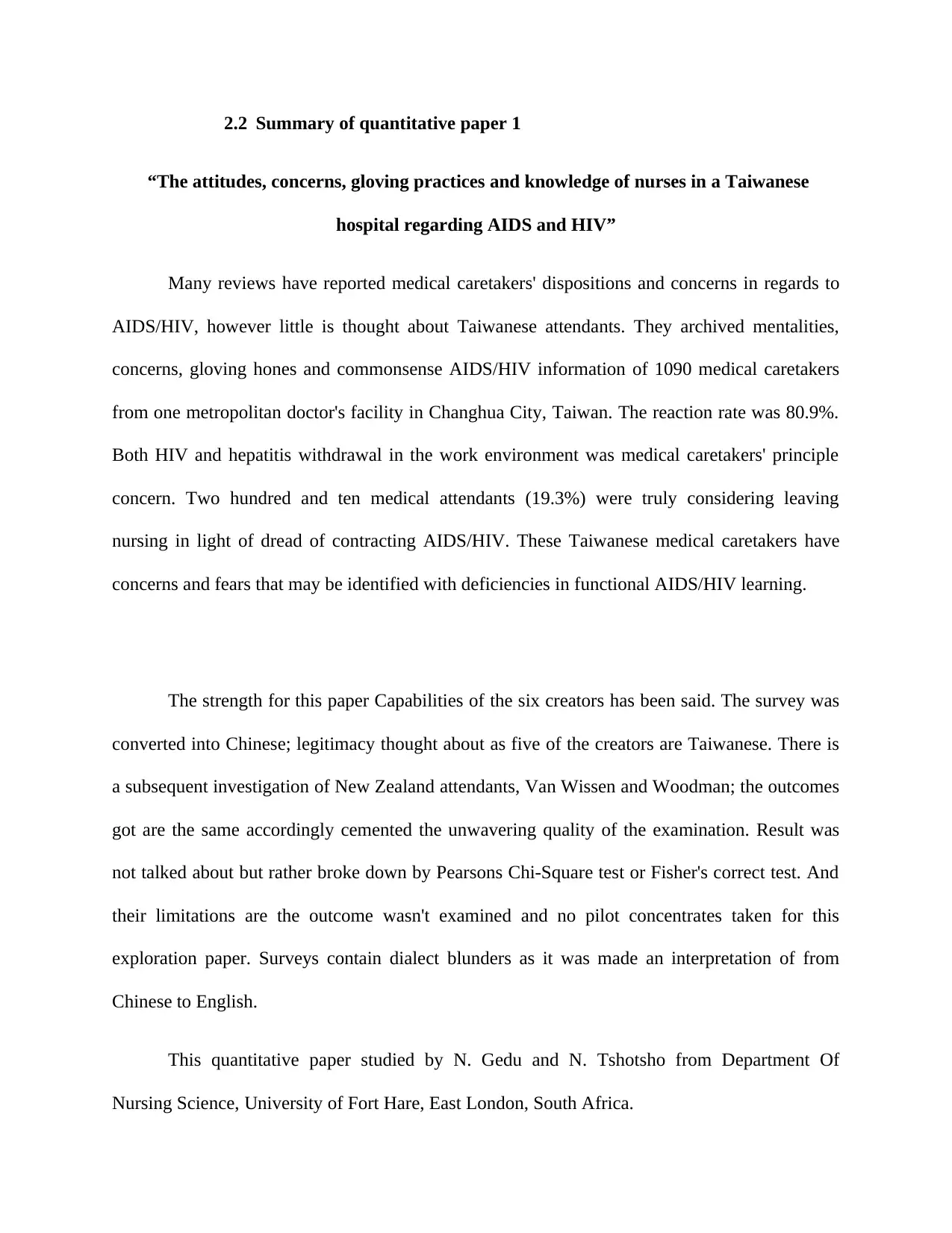
2.2 Summary of quantitative paper 1
“The attitudes, concerns, gloving practices and knowledge of nurses in a Taiwanese
hospital regarding AIDS and HIV”
Many reviews have reported medical caretakers' dispositions and concerns in regards to
AIDS/HIV, however little is thought about Taiwanese attendants. They archived mentalities,
concerns, gloving hones and commonsense AIDS/HIV information of 1090 medical caretakers
from one metropolitan doctor's facility in Changhua City, Taiwan. The reaction rate was 80.9%.
Both HIV and hepatitis withdrawal in the work environment was medical caretakers' principle
concern. Two hundred and ten medical attendants (19.3%) were truly considering leaving
nursing in light of dread of contracting AIDS/HIV. These Taiwanese medical caretakers have
concerns and fears that may be identified with deficiencies in functional AIDS/HIV learning.
The strength for this paper Capabilities of the six creators has been said. The survey was
converted into Chinese; legitimacy thought about as five of the creators are Taiwanese. There is
a subsequent investigation of New Zealand attendants, Van Wissen and Woodman; the outcomes
got are the same accordingly cemented the unwavering quality of the examination. Result was
not talked about but rather broke down by Pearsons Chi-Square test or Fisher's correct test. And
their limitations are the outcome wasn't examined and no pilot concentrates taken for this
exploration paper. Surveys contain dialect blunders as it was made an interpretation of from
Chinese to English.
This quantitative paper studied by N. Gedu and N. Tshotsho from Department Of
Nursing Science, University of Fort Hare, East London, South Africa.
“The attitudes, concerns, gloving practices and knowledge of nurses in a Taiwanese
hospital regarding AIDS and HIV”
Many reviews have reported medical caretakers' dispositions and concerns in regards to
AIDS/HIV, however little is thought about Taiwanese attendants. They archived mentalities,
concerns, gloving hones and commonsense AIDS/HIV information of 1090 medical caretakers
from one metropolitan doctor's facility in Changhua City, Taiwan. The reaction rate was 80.9%.
Both HIV and hepatitis withdrawal in the work environment was medical caretakers' principle
concern. Two hundred and ten medical attendants (19.3%) were truly considering leaving
nursing in light of dread of contracting AIDS/HIV. These Taiwanese medical caretakers have
concerns and fears that may be identified with deficiencies in functional AIDS/HIV learning.
The strength for this paper Capabilities of the six creators has been said. The survey was
converted into Chinese; legitimacy thought about as five of the creators are Taiwanese. There is
a subsequent investigation of New Zealand attendants, Van Wissen and Woodman; the outcomes
got are the same accordingly cemented the unwavering quality of the examination. Result was
not talked about but rather broke down by Pearsons Chi-Square test or Fisher's correct test. And
their limitations are the outcome wasn't examined and no pilot concentrates taken for this
exploration paper. Surveys contain dialect blunders as it was made an interpretation of from
Chinese to English.
This quantitative paper studied by N. Gedu and N. Tshotsho from Department Of
Nursing Science, University of Fort Hare, East London, South Africa.
Paraphrase This Document
Need a fresh take? Get an instant paraphrase of this document with our AI Paraphraser
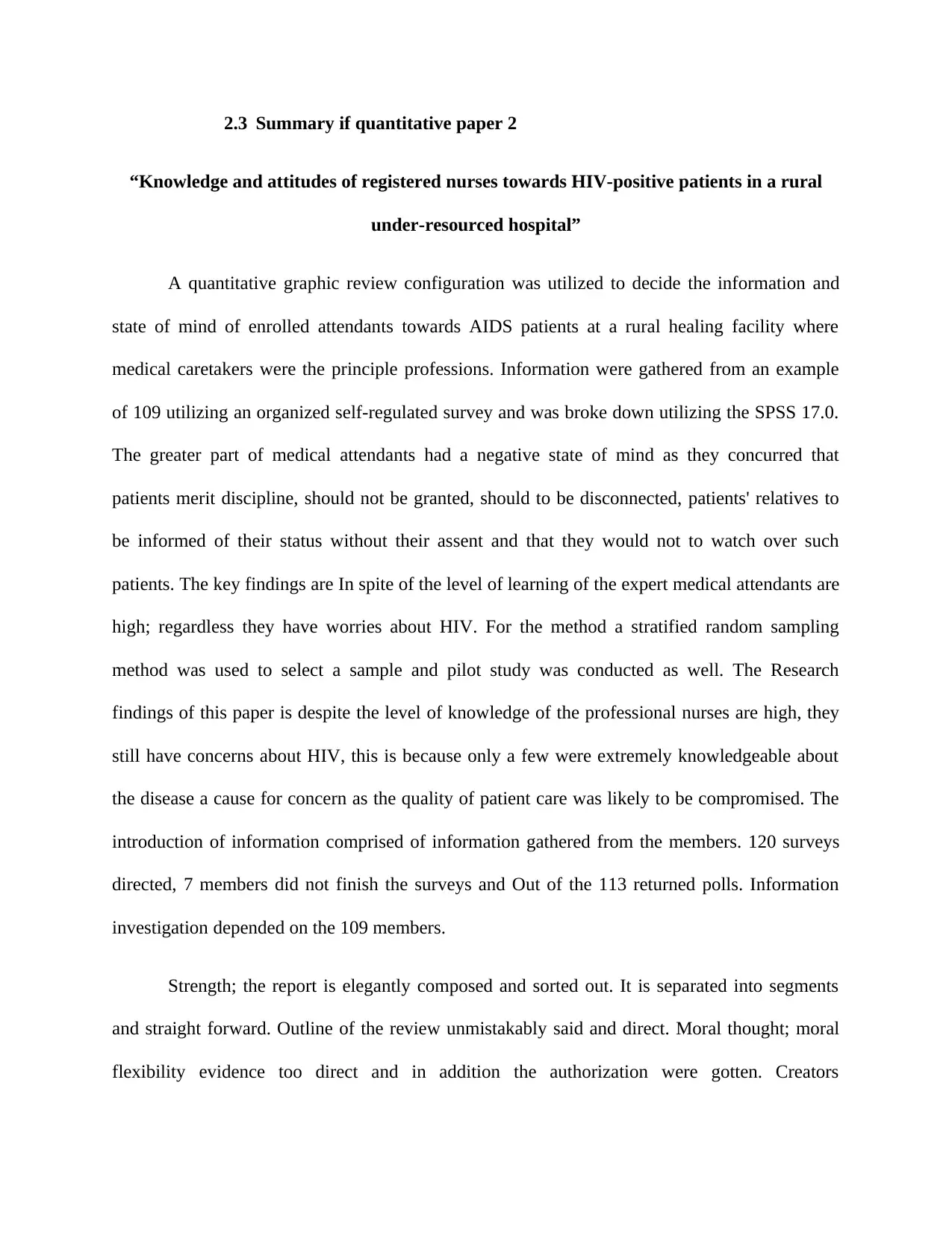
2.3 Summary if quantitative paper 2
“Knowledge and attitudes of registered nurses towards HIV-positive patients in a rural
under-resourced hospital”
A quantitative graphic review configuration was utilized to decide the information and
state of mind of enrolled attendants towards AIDS patients at a rural healing facility where
medical caretakers were the principle professions. Information were gathered from an example
of 109 utilizing an organized self-regulated survey and was broke down utilizing the SPSS 17.0.
The greater part of medical attendants had a negative state of mind as they concurred that
patients merit discipline, should not be granted, should to be disconnected, patients' relatives to
be informed of their status without their assent and that they would not to watch over such
patients. The key findings are In spite of the level of learning of the expert medical attendants are
high; regardless they have worries about HIV. For the method a stratified random sampling
method was used to select a sample and pilot study was conducted as well. The Research
findings of this paper is despite the level of knowledge of the professional nurses are high, they
still have concerns about HIV, this is because only a few were extremely knowledgeable about
the disease a cause for concern as the quality of patient care was likely to be compromised. The
introduction of information comprised of information gathered from the members. 120 surveys
directed, 7 members did not finish the surveys and Out of the 113 returned polls. Information
investigation depended on the 109 members.
Strength; the report is elegantly composed and sorted out. It is separated into segments
and straight forward. Outline of the review unmistakably said and direct. Moral thought; moral
flexibility evidence too direct and in addition the authorization were gotten. Creators
“Knowledge and attitudes of registered nurses towards HIV-positive patients in a rural
under-resourced hospital”
A quantitative graphic review configuration was utilized to decide the information and
state of mind of enrolled attendants towards AIDS patients at a rural healing facility where
medical caretakers were the principle professions. Information were gathered from an example
of 109 utilizing an organized self-regulated survey and was broke down utilizing the SPSS 17.0.
The greater part of medical attendants had a negative state of mind as they concurred that
patients merit discipline, should not be granted, should to be disconnected, patients' relatives to
be informed of their status without their assent and that they would not to watch over such
patients. The key findings are In spite of the level of learning of the expert medical attendants are
high; regardless they have worries about HIV. For the method a stratified random sampling
method was used to select a sample and pilot study was conducted as well. The Research
findings of this paper is despite the level of knowledge of the professional nurses are high, they
still have concerns about HIV, this is because only a few were extremely knowledgeable about
the disease a cause for concern as the quality of patient care was likely to be compromised. The
introduction of information comprised of information gathered from the members. 120 surveys
directed, 7 members did not finish the surveys and Out of the 113 returned polls. Information
investigation depended on the 109 members.
Strength; the report is elegantly composed and sorted out. It is separated into segments
and straight forward. Outline of the review unmistakably said and direct. Moral thought; moral
flexibility evidence too direct and in addition the authorization were gotten. Creators
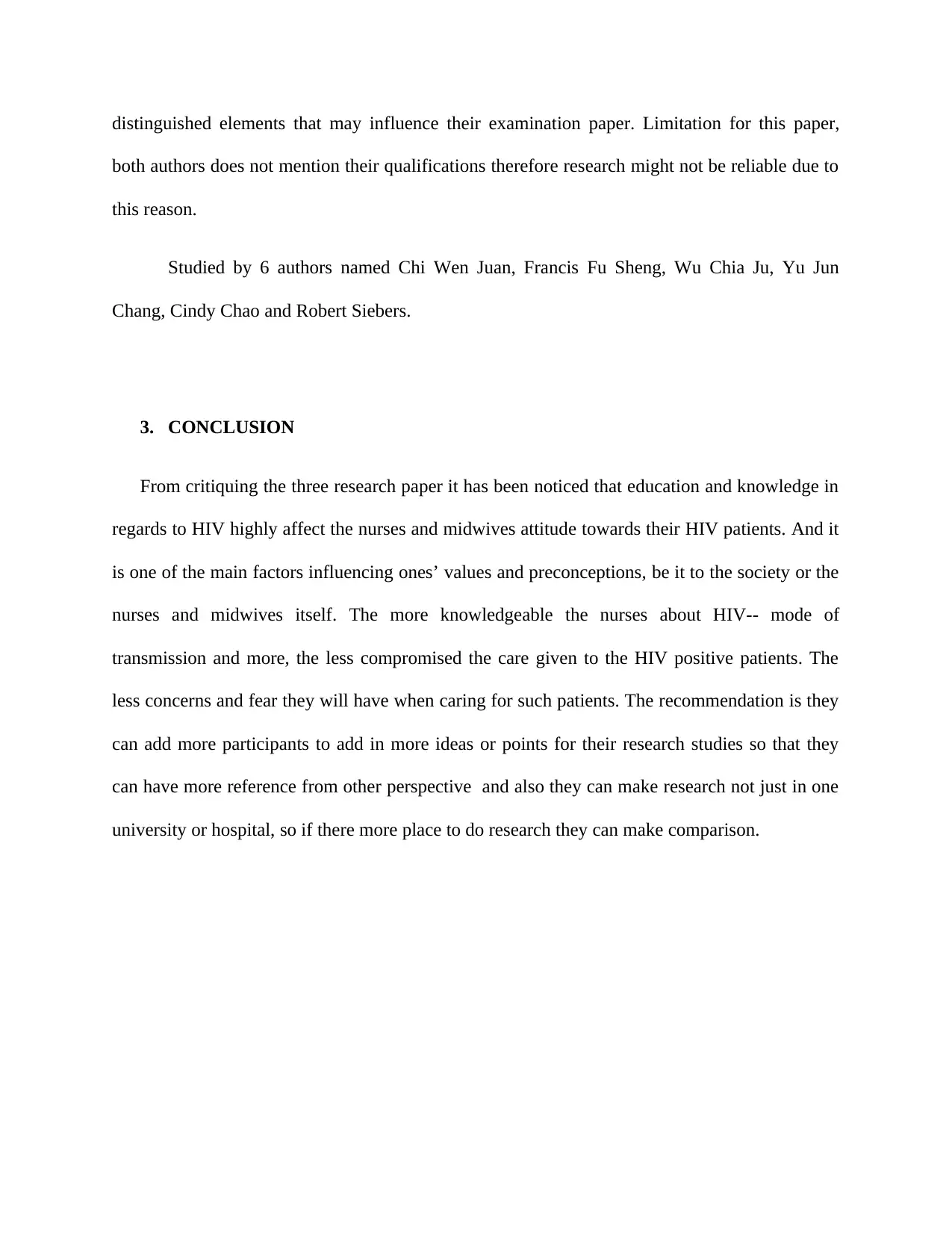
distinguished elements that may influence their examination paper. Limitation for this paper,
both authors does not mention their qualifications therefore research might not be reliable due to
this reason.
Studied by 6 authors named Chi Wen Juan, Francis Fu Sheng, Wu Chia Ju, Yu Jun
Chang, Cindy Chao and Robert Siebers.
3. CONCLUSION
From critiquing the three research paper it has been noticed that education and knowledge in
regards to HIV highly affect the nurses and midwives attitude towards their HIV patients. And it
is one of the main factors influencing ones’ values and preconceptions, be it to the society or the
nurses and midwives itself. The more knowledgeable the nurses about HIV-- mode of
transmission and more, the less compromised the care given to the HIV positive patients. The
less concerns and fear they will have when caring for such patients. The recommendation is they
can add more participants to add in more ideas or points for their research studies so that they
can have more reference from other perspective and also they can make research not just in one
university or hospital, so if there more place to do research they can make comparison.
both authors does not mention their qualifications therefore research might not be reliable due to
this reason.
Studied by 6 authors named Chi Wen Juan, Francis Fu Sheng, Wu Chia Ju, Yu Jun
Chang, Cindy Chao and Robert Siebers.
3. CONCLUSION
From critiquing the three research paper it has been noticed that education and knowledge in
regards to HIV highly affect the nurses and midwives attitude towards their HIV patients. And it
is one of the main factors influencing ones’ values and preconceptions, be it to the society or the
nurses and midwives itself. The more knowledgeable the nurses about HIV-- mode of
transmission and more, the less compromised the care given to the HIV positive patients. The
less concerns and fear they will have when caring for such patients. The recommendation is they
can add more participants to add in more ideas or points for their research studies so that they
can have more reference from other perspective and also they can make research not just in one
university or hospital, so if there more place to do research they can make comparison.
⊘ This is a preview!⊘
Do you want full access?
Subscribe today to unlock all pages.

Trusted by 1+ million students worldwide
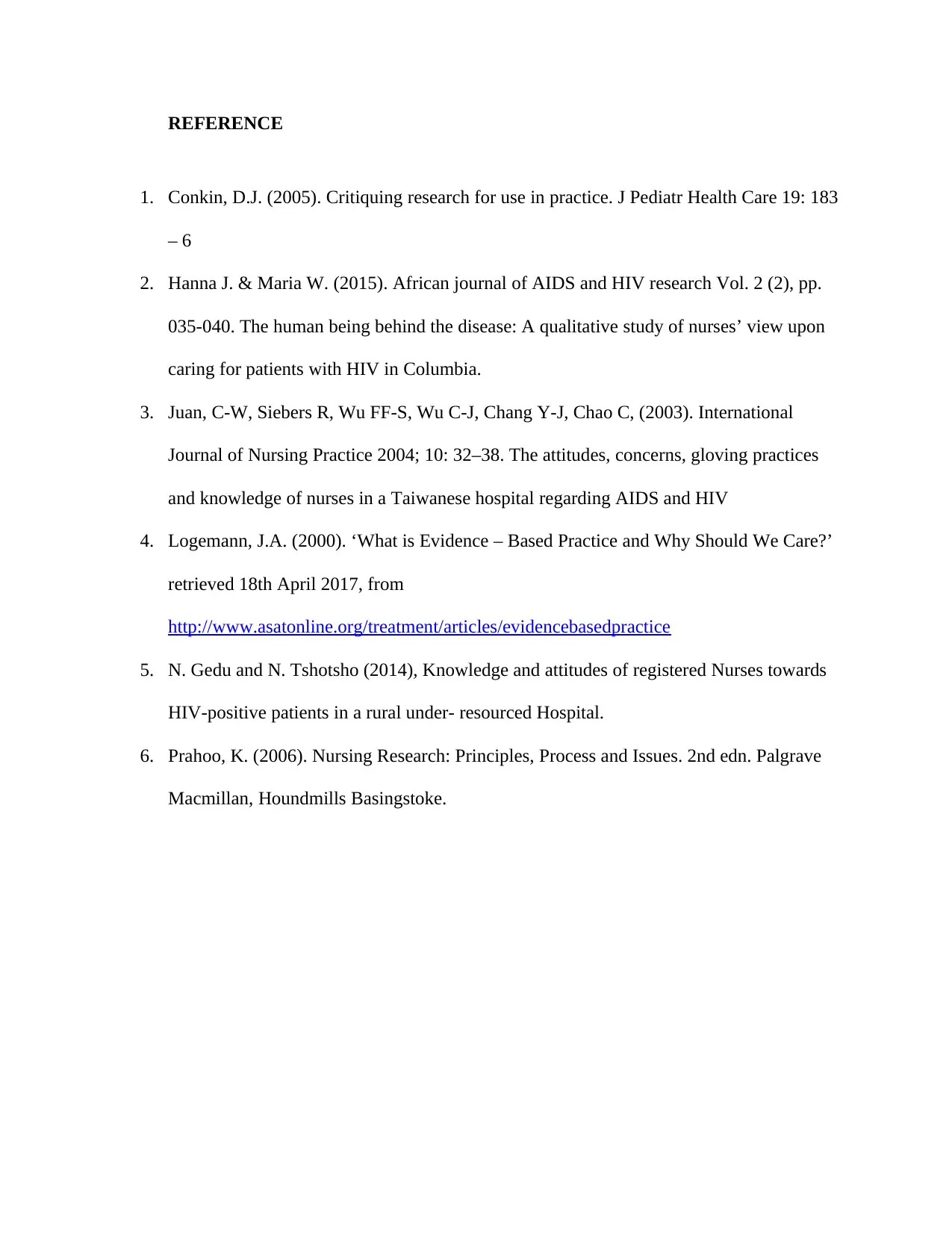
REFERENCE
1. Conkin, D.J. (2005). Critiquing research for use in practice. J Pediatr Health Care 19: 183
– 6
2. Hanna J. & Maria W. (2015). African journal of AIDS and HIV research Vol. 2 (2), pp.
035-040. The human being behind the disease: A qualitative study of nurses’ view upon
caring for patients with HIV in Columbia.
3. Juan, C-W, Siebers R, Wu FF-S, Wu C-J, Chang Y-J, Chao C, (2003). International
Journal of Nursing Practice 2004; 10: 32–38. The attitudes, concerns, gloving practices
and knowledge of nurses in a Taiwanese hospital regarding AIDS and HIV
4. Logemann, J.A. (2000). ‘What is Evidence – Based Practice and Why Should We Care?’
retrieved 18th April 2017, from
http://www.asatonline.org/treatment/articles/evidencebasedpractice
5. N. Gedu and N. Tshotsho (2014), Knowledge and attitudes of registered Nurses towards
HIV-positive patients in a rural under- resourced Hospital.
6. Prahoo, K. (2006). Nursing Research: Principles, Process and Issues. 2nd edn. Palgrave
Macmillan, Houndmills Basingstoke.
1. Conkin, D.J. (2005). Critiquing research for use in practice. J Pediatr Health Care 19: 183
– 6
2. Hanna J. & Maria W. (2015). African journal of AIDS and HIV research Vol. 2 (2), pp.
035-040. The human being behind the disease: A qualitative study of nurses’ view upon
caring for patients with HIV in Columbia.
3. Juan, C-W, Siebers R, Wu FF-S, Wu C-J, Chang Y-J, Chao C, (2003). International
Journal of Nursing Practice 2004; 10: 32–38. The attitudes, concerns, gloving practices
and knowledge of nurses in a Taiwanese hospital regarding AIDS and HIV
4. Logemann, J.A. (2000). ‘What is Evidence – Based Practice and Why Should We Care?’
retrieved 18th April 2017, from
http://www.asatonline.org/treatment/articles/evidencebasedpractice
5. N. Gedu and N. Tshotsho (2014), Knowledge and attitudes of registered Nurses towards
HIV-positive patients in a rural under- resourced Hospital.
6. Prahoo, K. (2006). Nursing Research: Principles, Process and Issues. 2nd edn. Palgrave
Macmillan, Houndmills Basingstoke.
1 out of 7
Related Documents
Your All-in-One AI-Powered Toolkit for Academic Success.
+13062052269
info@desklib.com
Available 24*7 on WhatsApp / Email
![[object Object]](/_next/static/media/star-bottom.7253800d.svg)
Unlock your academic potential
Copyright © 2020–2025 A2Z Services. All Rights Reserved. Developed and managed by ZUCOL.





